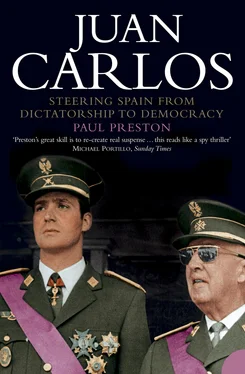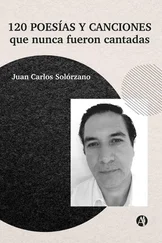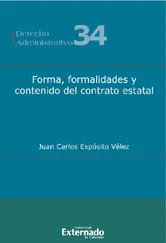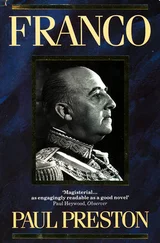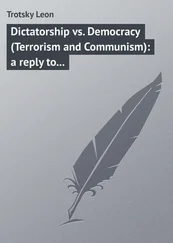Olghina provides an interesting testimony of the Prince’s personality and convictions as he entered his twenties. She knew a passionate young man, who liked fast cars, motorboats and girls, although he never forgot his position. He was, she said, ‘very serious albeit no saint’. She declared that ‘he wasn’t at all shy, but was rather puritanical’ and that ‘he was always very honest with me’. He disliked women whom he considered too calculating or ‘of less than stringent morals’. His puritanical streak was perhaps typical of a Spanish young man of his generation – it did not prevent him ardently pressing on her his ‘hot, dry and wise lips’ nor spending nights in hotels with her. He was also very generous, even though he didn’t have much money at the time. Interestingly, Olghina claims that Juan Carlos disliked hunting – one of Franco’s favoured pastimes – because he had no desire to kill animals. 56
When the interviewer suggested to Olghina that Juan Carlos’s letters gave the impression that he had been more attached to her than she to him, she replied that this wasn’t the case. The problem was, rather, that she was aware that he would never marry her. As a result, she tried to keep her distance from him. Juan Carlos, she said, ‘was very clear on the fact that his destiny was to give himself to Spain and that, in order to achieve this, he needed to marry into a reigning dynasty … Juan Carlos was convinced that he would be King of Spain.’ 57 It was later suggested that Olghina di Robilant blackmailed Juan Carlos. She was allegedly paid ten million pesetas by Juan Carlos for the letters, at which point she sent the originals to him but kept copies, which she then sold for publication. 58
Despite his close relationship with Olghina, Juan Carlos had María Gabriella di Savoia’s photograph in his room in the Zaragoza academy. He was ordered to remove it from his bedside table on the grounds that: ‘General Franco might be annoyed if he visited the academy.’ This ridiculous intrusion of the Prince’s privacy may have been an initiative of the director of the academy rather than of Franco himself. However, Franco knew about it. That there was no respect for Juan Carlos’s privacy would be seen again in 1958. When the Prince visited the United States as a naval cadet on a Spanish training ship, he took a fancy to a beautiful Brazilian girl at one of the dances organized for the crew members. He wrote to her, only to discover later that all his letters had ended up on Franco’s desk. Again, in late January 1960, having been informed that Juan Carlos still had María Gabriella’s photograph on his bedside table, the Caudillo would call in one of the Prince’s closest aides, Major Emilio García Conde, to discuss the matter. Clearly preoccupied by the significance of the photograph, Franco said, ‘We’ve got to find a Princess for the Prince.’ He then went on to list a series of names whose unsuitability was pointed out by García Conde. When the latter suggested the daughters of the King of Greece, Franco replied categorically, ‘Don Juan Carlos will never marry a Greek princess!’ He had two objections – the fact that they were not Roman Catholics and his belief that King Paul was a freemason. 59
The Caudillo felt that he had a right to interfere in the Prince’s romantic affairs. He told Pacón that he regarded María Gabriella di Savoia as altogether too free and with ‘ideas altogether too modern’. Newspaper speculation abounded about the Prince’s relationship with María Gabriella, and Juan Carlos remained keen on her for some time. It was rumoured that their engagement would be announced on 12 October 1960 at the silver wedding celebrations of Don Juan and Doña María de las Mercedes. The Prince’s choice of bride had enormous significance both for the royal family and the possible succession to Franco. The chosen candidate, irrespective of her human qualities, would have to be a royal princess, preferably of a ruling dynasty, financially comfortable and acceptable to General Franco. Sentiment would always take second place to political considerations. Some days before the anniversary party, the matter was discussed at a session of Don Juan’s Privy Council. On the basis of having enjoyed herself rather publicly at the previous spring’s Feria de Sevilla, María Gabriella was denounced as being frivolous – which José María Pemán thought ridiculous. In any case, Don Juan told Pemán: ‘I don’t think Juanito will be mature enough for at least a year or two.’ 60
Olghina di Robilant’s view that, already by the late 1950s, Juan Carlos believed that he would succeed Franco and thus take his father’s place on the throne was, of course, precisely the plan of Laureano López Rodó. On the reasonable assumption that there would be a monarchical succession to Franco, the Opus Dei was consolidating its links with both of the principal potential candidates. Thus, just as Rafael Calvo Serer remained close to Don Juan, so Juan Carlos was central to the far-reaching political plans of López Rodó.
In the wake of the internal dissent provoked by Arrese’s schemes, the Barcelona strike, serious economic problems and the push for an accelerated transition to the monarchy that had culminated in the death of Bautista Sánchez, Franco reluctantly decided that the time had come to renew his ministerial team. His hesitation was not just a symptom of his lifelong caution but was also a reflection of his inability to react with any flexibility to new problems. The cabinet reshuffle of February 1957 was to be a major turning point in the road from the dictatorship to the eventual monarchy of Juan Carlos. It was to open up the process whereby Franco would abandon his commitment to economic autarky and accept Spanish integration into the Organization for European Economic Co-operation and the International Monetary Fund. The weary Caudillo was ceasing to be an active Prime Minister and turning himself into ceremonial Head of State, relying ever more on Carrero Blanco as executive head of the government. The recently promoted admiral, no more versed than Franco in the ways of governing a modern economy, relied increasingly on López Rodó who, at 37 years of age, had become technical Secretary-General of the Presidencia del Gobierno . 61 The long-term implications of López Rodó’s growing influence could hardly have been anticipated by Franco or Carrero Blanco, let alone by Don Juan and his son.
The detail of the cabinet changes reflected Franco’s readiness to defer to the advice of Carrero Blanco who, in turn, drew on the views of López Rodó. Indeed, such was López Rodó’s closeness to Carrero Blanco that his own collaborators came to refer to him as ‘Carrero Negro’. 62 Having witnessed the ferocity of internal opposition to Arrese’s proposals, Franco now went in the other direction, clipping the wings of the Falange. The Falangists he appointed could scarcely have been more docile. Other key appointments saw General Muñoz Grandes replaced as the Minister for the Army by the monarchist General Antonio Barroso. While hardly likely to become involved in conspiracy, Barroso was infinitely more sympathetic to Don Juan than the pro-Falangist Muñoz Grandes. Most important of all was the inclusion of a group of technocrats associated with the Opus Dei. Together, López Rodó, the new Minister of Commerce, Alberto Ullastres Calvo, and the new Minister of Finance, Mariano Navarro Rubio, would undertake a major project of economic and political transformation of the regime. The implications of their work for the post-Franco future would dramatically affect the position of Juan Carlos. 63
That was made clear in some astonishingly frank remarks made by López Rodó to the Conde de Ruiseñada shortly after the cabinet reshuffle. López Rodó claimed in effect that the marginalization of Franco was one of the long-term objectives of the technocrats. He told Ruiseñada that the ‘ Tercera Fuerza ’ (Third Force) plans of Opus Dei members like Rafael Calvo Serer and Florentino Pérez Embid (the editor of El Alcázar ) were doomed to failure since, ‘it is impossible to talk to Franco about politics because he gets the impression that they are trying to get him out of his seat or paving the way for his replacement.’ He then made the revealing comment that ‘The only trick is to get him to accept an administrative plan to decentralize the economy. He doesn’t think of that as being directed against him personally. He will give us a free hand and, then, once inside the administration, we will see how far we can go with our political objectives, which have to be masked as far as possible.’ 64
Читать дальше
